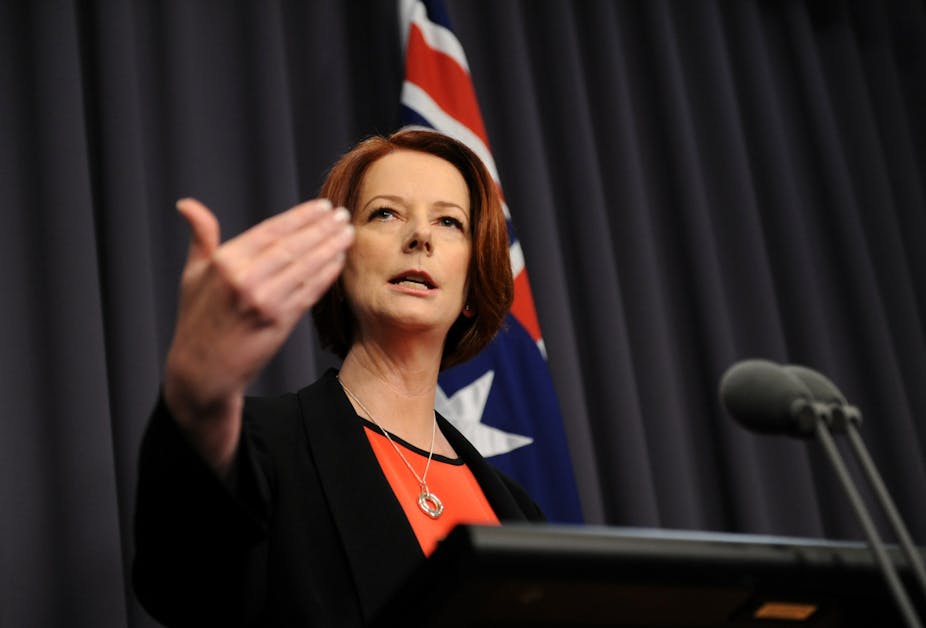Every time Prime Minister Julia Gillard repeats statements that she’s “done nothing wrong” in the AWU slush fund scandal story, it seems another journalist joins the fray.
No one covering the story has turned up a material fact to prove that Julia Gillard used AWU money to renovate her house, or that she knew about the misappropriation of union funds from within the AWU, or that she did anything other than what she again told Monday’s press conference. But the story’s viral now. And everyone wants a hit.
There’s an ethical problem, not because journalists are choosing not to call this story for what it is, but also because of the fundamental issue of fairness that it illustrates.
The ethical dimension of the media’s pursuit of the prime minister is more relevant to Australians wondering what’s going on with the media than with her. Whatever the public might learn out of The Australian’s chorus of campaigning journalists ready to hit us again with another version of nothing isn’t as important as the demonstrable unfairness.
The Australian media, now and in the past, punches above its weight with fair and accurate reporting on the international stage. But if it’s hard for readers here to figure out what’s driving this pack behaviour towards the prime minister, it must be pretty baffling to those bothering to watch all this from overseas.
There’s nothing fair about the choice by The Australian to run more content as breaking news when what’s already run on the issue has satisfied any duty to the public interest that was rightly claimed. When there’s no respect for factual evidence as it stands today, but merely a speculative stab at what might be a pre-Christmas dream story about a prime minister’s wrongdoing, we might as well be watching reality TV or checking out celebrities on Facebook.
Given that there’s also an assemblage of material showing Julia Gillard had nothing more she could offer the AWU story than what she had already said or supplied, for her to be compelled to keep talking is at best odd and at worst damaging to whatever trust the public still places in its news media. Australia’s public should instead be concerned about who is really running this story and what’s really motivating its players.
On ABC’s 7.30, Leigh Sales asked those questions of former AWU official Ralph Blewitt, pointing out at the time that his social media “Likes” of pages devoted to anti-Gillard smear campaigns of the “putrid” kind suggested that his sudden willingness to talk to Victoria Police arose from something other than civic duty.
There’s an ethical problem, too, with cashing in on a story just in case any of it turns out badly for Julia Gillard. She’s accountable now to a much bigger crowd than she was 20 years ago, when her boyfriend was an AWU official and she was a lawyer. But even as prime minister she doesn’t deserve harassment about her past as she goes about her job.
Granted, the prime minister is a much bigger media target than anyone else out there at the moment. It’s no great shakes news-wise, after all, to expose a dodgy union deal. “Big deal”, many would say – and in fact now are, given the comparative lack of attention to the men who had the money, and even to the direct statement by Bruce Wilson that Julia Gillard knew nothing about what was going on.
Mainstream campaign journalism being what it is, competing for its shrinking share of a public attention span focused largely on social media, journalists haven’t let a lack of evidence stop their pursuit of the prime minister. If mainstream media organisations are attempting to compete with the reach and timbre of social media at the expense of a sustained respect for evidence and fact-based reporting, then it’s journalists who practice such things who stand to lose most.
Journalism based on solid research and verified source material has uncovered serious wrongdoing not so long ago in Australia’s past, and for the benefit of a public’s right to know what matters. When there’s hardly anyone willing to question why an array of facts pointing away from the prime minister somehow keeps media organisations hot on her trail, it becomes solely a question of ethics answerable by journalists rather than Julia Gillard.

